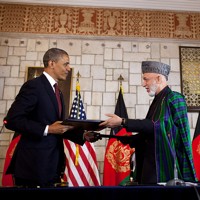The U.S.-Afghan strategic partnership agreement that President Barack Obama recently signed in Kabul with Afghan President Hamid Karzai is especially noteworthy for the lessons it successfully draws from similar agreements with Iraq and other countries, as well as for the pitfalls it avoids repeating.
For the past 90 years, negotiations toward such security agreements have repeatedly proved unsuccessful, divisive and downright destabilizing. Britain’s attempt to reach a similar treaty with Iraq in the 1920s contributed to years of tumult and instability in that country. In Iran in the 1960s, the Shah’s security agreement with the U.S. prompted an intense backlash that presaged the Islamic Revolution. Most recently in Iraq, negotiations over a postwithdrawal security agreement for residual U.S. forces were consistently contentious and eventually broke down.
In that light, it is all the more impressive that Obama was able to reach an agreement with Afghanistan at all. In particular, the Obama administration was successful because it identified and applied the lessons of history in three key ways.

